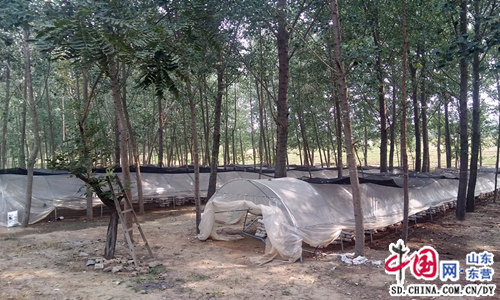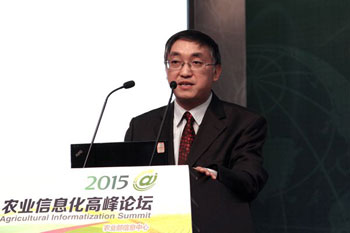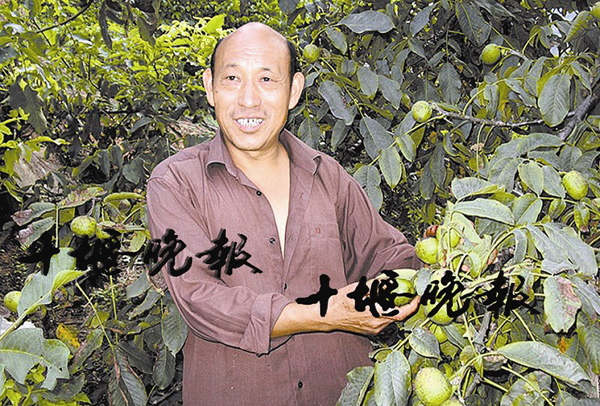The official of Lijin University Village uses small mushrooms to hold up the umbrella of getting rich.

The official of Lijin University Village uses small mushrooms to hold up the umbrella of getting rich.
Jiangjiazhuang Village in Lijin County is a traditional agricultural village dominated by cotton and corn cultivation, with dangerous workers in Xiaolizui of the Yellow River to the east, the Yellow River current is fast, and the villagers are constantly scouring the farmland along the river, and the villagers suffer from floods. Villagers see this situation and develop fast-growing poplar planting. Although they do not have to worry about flood disasters, fast-growing poplars grow for a long time, and the cost recovery is slow, which restricts villagers' income and wealth. After Shi Cheng, a college student village official, took up his post in the village, he regarded liberating the villagers' minds and increasing farmers' income as the first priority of his work, and led the villagers to go out to study many times.
"I don't want to dawdle around in the village, and the prices of food crops have fluctuated greatly over the past few years. The villagers work hard for a year and earn little money, which makes them feel very bad. We have to change the current situation of the villagers." University student village official Shi Cheng expressed his ideas in simple words.
In order to master the techniques of planting edible fungi under the forest, Shi Cheng led the villagers to Guangrao, Shouguang and other places to learn the techniques of planting edible fungi under the forest. In order to save money and the cost of building the greenhouse, Shicheng inspected the material market by himself, groped and learned the greenhouse construction technology, made greenhouse materials with the villagers to build a mushroom shed, and put 10,000 jin of bacteria into experimental planting in August this year.
It is easier said than done. The cultivation of Pleurotus ostreatus should not only master the humidity, ventilation and temperature of cultivation, but also master the technology of preventing and controlling diseases, insect pests and germs, which is a blank for young graduates who have just graduated. You need to explore and learn. Shicheng came to the shed every day to observe, groping and learning, constantly recording the daily air humidity and temperature, and observing the growth of bacterial sticks. In mid-September 2015, after a light rain, mushroom buds appeared one after another. "when I saw the growth of small mushrooms, I was so excited that I felt that I was finally going to see the harvest with everyone." Since then, there has been more experience in planting, and Pleurotus ostreatus is growing better and better.
After the technical difficulties in planting have been broken little by little, how to sell Pleurotus ostreatus is another "Kaner" in front of Shicheng. In order to sell fresh mushrooms, Shicheng picks mushrooms before 4 o'clock every morning and pulls them to the morning market at 5 o'clock. "I remember that the first time I opened my mouth and shouted, I really had no courage and was very embarrassed. I plucked up the courage to shout out the first voice, and now it is also a very interesting thing to think about it." Shi Cheng smiled shyly about the first time he went to the market to sell mushrooms. After a period of efforts, Shicheng mushrooms were quickly recognized by the market, and the more than 100 jin of mushrooms picked every morning sold out in less than a small one.
There are also a series of problems on the road of pursuing the dream, such as the slow growth of Pleurotus ostreatus under the forest in winter and great price fluctuations. "on the one hand, we should continue to lead the villagers to master planting techniques and increase production. On the other hand, there are a lot of free henhouses in the village. Use the gap period at the end of laying hens to transform the farmers' henhouses into culture rooms, so that mushrooms can also be planted in winter." Shicheng is making a new round of plans with confidence.
Related
- A course of planting techniques and methods on how to grow carrots
- How to plant the latest tulips?
- Is it better to pick tea in the morning or in the afternoon? When is the best time for tea to be picked? what is the third or fifth tea?
- Launch Yuanxiao Happy combination Haocha + Tea Yuan healthy Taste
- Penghu Tourism "Fireworks 20 Parade with You"
- 2022 West Lake Happiness holds "Digital Revitalization Voucher" and draws iphone13 and laptop.
- Banqiao Fuzhou social houses are designed to change start-up combined with police elimination to create a safe and livable environment
- The convenient measure of "mechanical weeding" in Xinbei has been abused and the Agriculture Bureau has imposed heavy penalties on the illegal land consolidation.
- Changgeng University Joins Hands with Four Memory Factories to Rescue Memory Talent Shortage
- The list of Taiwan's top 100 MVP managers is listed by the Director-General of the Farmers' Association of Sanxia District.



